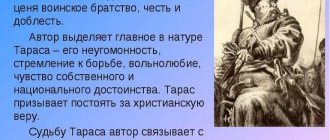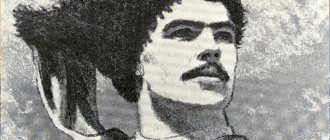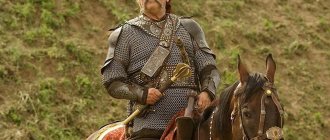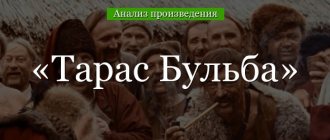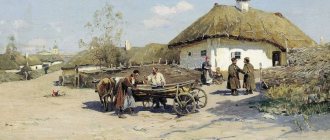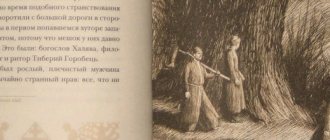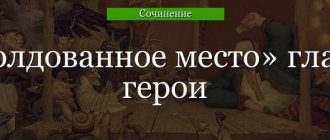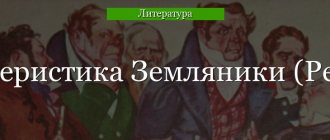In the story “Taras Bulba”, created by Nikolai Vasilyevich Gogol, we meet the three main characters: Taras Bulba, Ostap and Andriy.
It is the latter that is the most ambiguous, complex, and contradictory. What is his inner world like? What kind of personality is this? How is his relationship with other characters in this work? Let's try to answer these questions by tracing the short life path of this character, and also find the relationship between his actions and character with the realities of time. The characterization of Andriy from the story “Taras Bulba” is brought to your attention.
Appearance Andria
First, let's look at the appearance of this character. Its description appears several times in the text of the work. The author notes that he was “good-looking”, had “big eyes”, this hero had a “courageous face”, which reflected strength and charm.
The characteristics of Andriy from the story “Taras Bulba” are revealed in his appearance. Gogol describes his hero this way: he is a young man with a healthy, strong face, already covered with fluff of hair, with a black mustache shading his whiteness. And after participating in battles, he notes that the youthful softness disappeared from his face, it has now become strong and formidable. This is the appearance of Andriy from Taras Bulba.
Nikolai Vasilyevich conveys the portrait of this hero through the opinions of other characters in the work about him: thus, according to the Polish woman he met in the besieged city, he was a strong and handsome young man, courageous, who denounced the “cheeky freedom” of his movements even in immobility, his gaze he was firm and clear, his “velvet eyebrow” arched “in a bold arch,” and his “tanned cheeks” sparkled with fire, his black mustache was shiny “like silk.” This is how Andriy’s appearance from “Taras Bulba” is complemented by a woman’s perception of him.
The title character, looking at his dead son, notes that he was black-browed, “tall in figure,” with a face “like that of a nobleman,” and his hand was strong in battle.
Tag: Essay “Taras Bulba”
In the work “Taras Bulba”, mother and father treat their children differently. The mother is a gentle and fragile woman, the father is a stern and formidable man. Accordingly, they have not only different characters, but also different attitudes towards their children.
The mother treats her children with trepidation and looks forward to meeting them: “...their pale, thin and kind mother, standing at the threshold and not yet having time to hug her beloved children.” ...
read more “how Taras Bulba and mother treat their sons”
The first chapter prepares the reader for subsequent events: it gives the plot (Taras’s decision to go with his sons to the Sich) and an idea of the time when the action takes place; indicates the conditions in which characters like Taras are formed; complex and contradictory images of Taras himself and his sons appear. The chapter contains many expressive genre scenes and is permeated with subtle lyricism. ...read more “Recreating the color of the era and the atmosphere of the heroes’ childhood in the story “Taras Bulba””
The ideological pathos of “Taras Bulba” lies in the boundless merging of a person’s personal interests with the interests of the people. Only one image of Andriy is sharply isolated in the story.
It opposes the national character and seems to break out of its main theme.
The shameful death of Andriy, which is a necessary moral retribution for his apostasy and betrayal of the people's cause, further emphasizes the greatness of the central idea of the story. …read more “Ideological pathos of “Taras Bulba””
“Taras Bulba” is not an ordinary historical story. It does not reflect any accurate historical facts or historical figures. It is not even known in what century the story took place.
Important
It was more important for Gogol to give an idea of the ideal social system, which, due to its democracy, was capable of generating heroes. The Zaporozhye Sich was such an ideal for Gogol, and it is no coincidence that he several times calls it a republic...
.read more “Essay on the story “Taras Bulba””
The fate of the people, which worried A. S. Pushkin and M. Yu. Lermontov, became a source of inspiration for N. V. Gogol. In his story, Gogol managed to recreate the epic power and greatness of the struggle of the Ukrainian people for their national independence and at the same time reveal the historical tragedy of this struggle.
The epic basis of the story “Taras Bulba” was the national unity of the Ukrainian people, formed in the fight against foreign enslavers, ...read more “Display of patriotism in the epic story “Taras Bulba””
The writer has always been keenly interested in the history of the Ukrainian people, which is proven by his series of articles devoted to the history of Little Russia. In the story “Taras Bulba” Gogol refers to the historical past of the people. It depicts the struggle of the Cossacks of the Zaporozhye Sich for their independence.
It is very difficult to determine the chronological boundaries of certain events in the work. Some phenomena could have occurred in the fifteenth century, others could have happened no earlier than the seventeenth century. ...read more “The heroic, sublime beginning in the Cossacks’ struggle for independence (based on the story by N.V.
Gogol "Taras Bulba"
For Gogol, the special theme of Andria clearly shines through. It is interesting to follow how it develops, how gradually and inevitably a certain poeticization of the hero is replaced by debunking.
Andria's theme will be in conflict with the epic tendency of the story. Ostap is epic: he is manifested through deed and action. “Immersed in the charming music of bullets and swords” (II, 85) is the feeling of Andriy. ...
read more “The image of Andriy in the story Taras Bulba”
“Taras Bulba” by Gogol is a story about the heroic past of our homeland. In it, Gogol tells us about how courageously the Cossacks fought for their homeland and faith against the infidels.
The action of the story takes place in the Zaporozhye Sich - a kind of Cossack republic in which all the strength of the Ukrainian army was concentrated. At the time that Gogol tells us about, Taras was already old. ...
read more “Why Taras Bulba can be called a national hero”
The story “Taras Bulba” is one of the most perfect creations of N.V. Gogol. It cost the writer a lot of work. In the story, Gogol talks about the heroic struggle of the Ukrainian people for their national liberation.
The main events take place in the Zaporozhye Sich, in the kingdom of freedom and equality. This is a free republic in which people of broad soul live, absolutely free and equal, where strong and courageous characters are brought up. ...
read more “Taras Bulba - The Main Character”
Ukraine, occupying an advantageous position on the trade routes between the Baltic and Black Seas, between the West and the East, has attracted neighbors for a long time.
For many centuries, the rich Ukrainian lands were subjected to devastating raids by Tatars and Turks, Lithuanian and Polish conquerors. But thousands and thousands of peasants refused to put up with enslavement.
They fled to the less populated steppe regions of South-Eastern Ukraine, ...read more “Combat partnership of the Zaporozhye Sich (based on the story “Taras Bulba” by N.V. Gogol)”
Source: https://sochineniya-na5.ru/tag/sochinenie-taras-bulba/
Hero's childhood
This youngest son of the battle-hardened Taras Bulba, a Cossack colonel, an Orthodox Christian revered by the Cossacks, spent his childhood in a modest house among meadows and trees, where, together with his older brother, he was surrounded by the love and boundless care of his mother. The boys rarely saw their father, but they respected and feared him very much. Ostap and Andriy (“Taras Bulba”) from the age of 12 studied at Bursa (Kyiv Academy), a prestigious educational institution at that time, but distinguished by harsh customs and morals (half-starved life, beatings, etc.).
Role in the work
N. Gogol’s story “Taras Bulba” is not only an essay about the glorious historical past of Ukraine, about the bloody battles between it and the Polish-Lithuanian Commonwealth . This work also illustrates the personal drama of the protagonist, who is destined to lose his two sons. One of them fell at the hands of Taras himself, the other was brutally tortured by his enemies.
If Taras and the elder Ostap can be called without hesitation real Cossacks, folk heroes, then what place is given to Andrei in the work? Who was the youngest son: a vile traitor, a reckless young man in love, an unhappy man? The author decided to leave the answer to this question to his readers.
Studying at Bursa
It is in the bursa that the formation and development of the hero’s character takes place. The characterization of Andriy from the story “Taras Bulba” during training is as follows. The boy easily and willingly assimilates knowledge, has leadership abilities, is often the leader of a “dangerous enterprise,” has an inventive mind, is resourceful and cunning (knows how to evade punishment). Like all young people of that time, he longed for exploits and, moreover, for love, the need for which vividly flared up in him when the young man turned eighteen.
Need for love
It is this trait, the need for female friendship, that is distinctive for this character. The image of Andriy from Taras Bulba is revealed precisely in love. His attitude towards women is very different from what was generally accepted among the Cossacks of that time. He approaches representatives of the opposite sex as goddesses, they are the object of his worship and admiration. The remark of Gogol, who wrote that only “women adorers” could not find anything in the Zaporozhye Sich, predetermines the life path of this man.
Time itself, its realities, force the young man to be secretive, since in that age it was dishonest and shameful for a Cossack to think about love and a woman without first having tasted battle. Only by becoming a hero and warrior can you achieve the favor and attention of a beautiful lady. For Andriy, a feat is not the end, it is just a means to achieve the main goal, which is love.
Characteristics of Andriy from Taras Bulba
An interesting literary work always has several narrative plans, several plot lines and, of course, memorable, colorful characters. Gogol's story "Taras Bulba" reflects not only an idealized idea of the historical past, but also shows the personal drama of the main character - Taras Bulba - and his two sons - Ostap, the eldest son, and Andriy, the youngest. If Taras can be called a folk hero, and Ostap can be called a real Cossack, then what about Andriy? Who is he: a traitor, a daredevil, a foolish young man? This issue can be understood thanks to the detailed description of Andriy from Taras Bulba.
The reader meets Andriy already in the first chapter. It becomes known that he and his brother returned home after graduating from the seminary. It’s clear that these are still children: they are embarrassed, they hesitate, they are embarrassed by their father’s reaction to their arrival. “...two strapping young men, still looking from under their brows, like recently graduated seminarians. Their strong, healthy faces were covered with the first fluff of hair that had not yet been touched by a razor.”
In honor of the return of Ostap and Andriy, Bulba gathered all the centurions to show off their children. And “the guests congratulated Bulba and both young men and told them that ... there is no better science for a young man than the Zaporozhye Sich.” Taras Bulba decides to implement this idea. Literally the next day, travelers set off for the Sich.
Taras Bulba's son Andriy is revealed throughout the entire work. In “Taras Bulba” the description of Andriy is given only in pieces, thanks to which a complete image is created. This is a handsome young man. “His eye sparkled with clear firmness, his velvet eyebrow arched in a bold arc, his tanned cheeks shone with all the brightness of virgin fire, and his young black mustache shone like silk.”
In the second chapter there is a kind of retrospective: it becomes known how the youngest son showed himself while studying at the seminary. It is there that the character of Andriy from Taras Bulba is formed. The young man “had feelings somewhat more lively and somehow more developed.” Studying was easy for him, and he liked studying. Despite this, it was Andriy who was most often the “leader of a rather dangerous enterprise,” but with the help of his ingenuity he knew how to get away with it. Taras Bulba in Andria saw great potential for his son to become a glorious Cossack. Brave, decisive, easy-going, always finding an unusual way out of a situation.
In addition to the love of adventure, Andria early discovered the need to love and be loved, but he was ashamed to talk about this to his comrades or brother. Every year he participated less and less in any escapades; he liked to walk around Kyiv, enjoying the beauty of the gardens and the attractiveness of the old nooks and crannies. One day he met the daughter of a Polish gentleman and, forgetting about common sense, decided that same evening to sneak into her chambers. It is interesting that Andriy in the story “Taras Bulba” is the only character with whom a love line is connected. Sensitivity to the beauty of nature and incredible lyricism in relations with the lady are closely connected and indivisible. Andriy is initially shown as a character capable of sensing more subtle matters. This image is covered with a romantic aura. There is a cult of service to a beautiful lady, passionate confessions, and an amazing meeting with the lady, many years after one evening spent together. Neither the Cossack’s feelings nor the girl’s feelings could fade away, despite the passage of time.
The father loved both of his sons, raised in them a love of freedom, faith and their native land, and sent them to receive a good education at the Kyiv seminary. He most of all wanted them to continue his work - sincere service to His people and Motherland. That is why Andriy’s betrayal of Taras Bulba outgrows the scale of a family drama. This becomes a kind of conflict between two different points of perception of the world. For Bulba, his whole life was perceived as a gallant battle for justice; for his youngest son, love turned out to be more important than his father’s values. It is worth noting that neither of the two positions can be called limited. The reality of each character was refracted through his own prism of worldview. Despite the fact that Bulba is married, his relationship with his wife cannot be called romantic. Quite the contrary. Taras does not listen to her, treats her like a servant, shouts and hits her. Love feelings, if they existed, are irrevocably gone. With Andriy, the situation is different: once he saw a beautiful girl, feeling his heart filled with warmth, Andriy could not forget it, could not refuse. He sees the lady a few years after that evening in Kyiv. She changed, matured, but this made her seem even more beautiful to the young man. He talks to her about how he feels, and is not afraid to be himself around this girl. Andriy speaks truly beautifully and heartfeltly: “Tsarina. for one hilt of my saber they give me the best herd and three thousand sheep. And I will refuse all this, throw it away, throw it away, burn it, drown it, if only you utter one word... or even just move your thin black eyebrow! You are another creation of God...” He hugs her reverently, not wanting to never part with her again.
Daydreaming
This hero of the work was full of dreaminess, contemplation and romantic ideas. The characterization of Andriy from the story “Taras Bulba” is supplemented by the following detail. He loved to wander alone in secluded corners of Kyiv. The romantic and lyrical image of this character is revealed by Gogol with the help of a description of nature (starry sky, cherry orchards, etc.). At the same time, however, Andriy is a man, first of all, of action, and therefore his inner world uncontrollably yearned for freedom, demanding embodiment in reality.
Desired meeting
A chance meeting with a girl, the daughter of a Kovno voivode, gave rise to the realization of a feat in the name of the lady (more precisely, a daring penetration through the chimney into her bedroom). A brave, crazy, but, alas, rash act, since the hero did not know what to do next. He did not dare to “move his hand” from timidity and stood with his eyes downcast. This episode clearly characterizes the personality of this character: he is shy and modest, but at the same time decisive and daring, inspired and impetuous, but never thinks about the consequences and does not foresee them.
Life among the Cossacks
Having found himself in the Sich at the behest of his father, Andriy (“Taras Bulba”) plunged into a riotous life with all his fiery nature (he shot accurately and smartly, became in good standing with the Cossacks, swam across the Dnieper against the current). The opportunity to participate in hostilities delighted this hero, and he immersed himself in the music of swords and bullets. Gogol writes that this hero did not know what it meant to calculate, deceive, or measure in advance the strengths of others and his own. He saw only “rapture” and “mad bliss” in battle. The image of Andriy from Taras Bulba is thus supplemented with new features. Even Taras himself was amazed at his son, who with his onslaught produced miracles that even battle-hardened warriors admired.
Appearance of Andria
He has dark skin, black hair, dark, attractive eyes. The youngest son of Taras is tall - more than 2 meters. Everyone admires Andria’s beauty—the parents, the young Pole, and even the author himself. Over time, his facial features become sharper and more courageous, but therefore gain even more attractiveness. Andriy has an athletic, strong body build.
The young man takes care of his appearance and loves fashionable, beautiful clothes. In the text of the story there is a description of his attire: a copper-colored hat, boots with silver heels made of expensive red morocco. He wears bloomers so wide that they resemble the sea. The young man’s belt is embroidered with gold brocade, and there are many beautiful decorations on it. Readers get an approximate image of the youngest son Taras:
- High growth.
- Possesses enormous physical strength.
- The young man has dark, beautiful skin and black hair.
- An attractive face with delicate feminine features. The eyes are large and black.
In military affairs, Andriy appears greedy for battle and brave. But he does not know how to plan or think through his actions in advance. For him, the Zaporozhye Sich is a field for releasing a large amount of young energy; a place where you can realize your potential.
But thanks to his temper and strength, he shows real miracles of military affairs, which even the older Cossacks, who had seen everything in their lifetime, were sometimes surprised. These qualities usually brought unconditional victory in all endeavors.
Causes of death of Andria
What ultimately led this brilliant young man to betrayal and premature and inglorious death?
Among the main reasons are the following: the passionate and impressionable nature of the hero, his fragile personality, a character that has not yet been formed, some gaps in his upbringing, his unconscious desire to get out of the power of an oppressive parent, youthful maximalism and selfishness, all-consuming passion, as well as a fatal coincidence of circumstances (a girl suffering from hunger in a besieged city, majestic organ music, townspeople dying of exhaustion, a meeting with her beloved, a Polish woman’s declaration of love). This is the main characteristic of Andriy (the story “Taras Bulba”) and the reasons for his tragic death.
Realizing that the passion for the girl is mutual, that his desired, secret dream has finally been achieved, the hero forgets about everything and renounces his homeland, his comrades, his father, without thinking at all. He says to the girl: “You are my homeland!” “And the Cossack disappeared!” - writes Nikolai Vasilievich.
The transition of this hero to the side of the enemy, a spontaneous and rash act, is nevertheless understandable and explainable. After all, love and murder are two incompatible things, like “genius and villainy.” And Andriy (“Taras Bulba”) killed his comrades without any regret.
His image is woven from contradictions, as in any person there is a devil and God at the same time, and the fate of each of us depends on what choice is made.
- Author: N.V. Gogol
- Work: Taras Bulba
- This essay has been copied 128,360 times
Very vividly and reliably N.V. Gogol presented the reader with the image of one of the main characters of the story “Taras Bulba”, Taras’s youngest son, Andriy. His personality is well described in completely different situations - at home with his family and friends, at war, with enemies, and also with his beloved Polish woman. Andriy is a flighty, passionate person. With ease and madness, he surrendered to the passionate feelings that the beautiful Pole ignited in him. And having betrayed the beliefs of his family and his people, he abandoned everything and went over to the side of his opponents. The powerful and warlike heroism of the Sich did not inspire him. Andria's soul, demanding romance, was drawn to love adventures. This desire for personal happiness and love nevertheless triumphed over other impulses, and made him a traitor to his homeland. However, Andriy's image is much more complex than it might seem.
The writer did not want to present him as an unscrupulous villain. Andriy has spiritual strength, his inner experiences are of a complex dramatic nature. The work also shows the courage and considerable physical strength of Andriy. At first glance, it seems that the brave, warlike Ostap is shown as the absolute opposite of the romantic Andriy. But that's not true. They are both courageous and broad-minded. Taras Bulba many times admired his youngest son and said: “And this good - the enemy did not take him - warrior!” Even during his studies, Andriy stood out from everyone with his ingenuity, logic and courage. He was often put in charge of carrying out dangerous and responsible activities. But Andriy, unfortunately, easily succumbed to feelings and easily plunged into them headlong. This was the cause of his tragedy. But you shouldn’t think that Andriy is not capable of experiencing real, sincere feelings.
His love for the Polish woman is filled with romance and passion. N.V. Gogol showed well the emotional experiences of Andriy, which pushed him to betrayal. He was not a scoundrel, and would never have done such an act without reason. Andriy loves a beautiful Polish girl very much. However, there is no harmony in these feelings. On the one hand, he experiences a wonderful, inspiring feeling. On the other hand, he is tormented by his conscience because he betrayed his family and friends.
Once passionate love, which was the meaning of life, ceases to bring joy and consolation to Andriy. This feeling did not bring the expected happiness. On the contrary, it took away from him everything that was previously very important to him - his own father, devoted friends and homeland. Andriy became a traitor for them, and this is not forgiven to anyone. Nothing could ever justify the act he committed.
The story “Taras Bulba” shows the boundless patriotism of the people, which does not take into account the personal needs and feelings of a person. And only one character stands out from the crowd. Andriy resists popular beliefs and seems to be breaking away from the main theme of the story. Taking into account the main idea of the work, the murder of a son by a father can be considered a necessary reprisal against a traitor to the motherland.
Check out these essays
- Folklore elements in Gogol's story “Taras Bulba” The story is Nikolai Vasilyevich Gogol’s favorite genre. The image of the main character of the story “Taras Bulba” was created on the basis of the images of outstanding figures of the national liberation movement of the Ukrainian people - Nalivaiko, Taras Tryasylo, Loboda, Gunya, Ostranitsa, etc. In the story “Taras Bulba” the writer created the image of a simple freedom-loving Ukrainian people. The fate of Taras Bulba is described against the backdrop of the struggle of the Cossacks against Turkish and Tatar rule. In the image of Taras, two elements of narration merge – the usual [...]
- Comparative characteristics of “Ostap and Andriy” (table) Ostap Andriy Main qualities An impeccable fighter, a reliable friend. Sensitive to beauty and has a delicate taste. Character: Stone. Refined, flexible. Character Traits: Silent, reasonable, calm, courageous, straightforward, loyal, courageous. Brave, courageous. Attitude to traditions Follows traditions. Adopts ideals from elders unquestioningly. He wants to fight for his own, and not for traditions. Morality Never hesitates when choosing duty and feelings. Feelings for [...]
- Hyperbole as the main device of Gogol’s story “Taras Bulba” Nikolai Vasilyevich Gogol’s story “Taras Bulba” is dedicated to the heroic struggle of the Ukrainian people against foreigners. The image of Taras Bulba is epic and large-scale; the main source for creating this image was folklore. These are Ukrainian folk songs, epics, tales of heroes. His fate is shown against the backdrop of the struggle against Turkish and Tatar rule. This is a positive hero, he is an integral part of the Cossack brotherhood. He fights and dies in the name of the interests of the Russian land and the Orthodox faith. Portrait […]
- Why Taras was not satisfied with life in the Sich The legendary Zaporozhye Sich is the ideal republic that N. Gogol dreamed of. Only in such an environment, according to the writer, could powerful characters, brave natures, true friendship and nobility be formed. Acquaintance with Taras Bulba takes place in a peaceful home environment. His sons, Ostap and Andriy, have just returned from school. They are the special pride of Taras. Bulba believes that the spiritual education that his sons received is only a small part of what the young man needs. “All this rubbish they stuff […]
- The image of Taras Bulba (essay) The main character of Gogol's story of the same name, Taras Bulba, embodies the best qualities of the Ukrainian people, forged by them in the struggle for their freedom from Polish oppression. He is generous and broad-minded, sincerely and ardently hates his enemies and also sincerely and ardently loves his people, his fellow Cossacks. There is no pettiness or selfishness in his character; he devotes himself entirely to his homeland and the struggle for its happiness. He does not like to bask and does not want wealth for himself, because his whole life is in battles. All he needs is an open field and a good […]
- The image of Ostap in the story “Taras Bulba” The work of Nikolai Vasilyevich Gogol “Taras Bulba” allows the reader to be transported back to ancient times, when ordinary people fought for their happy, cloudless life. They defended their freedom to calmly raise children, grow crops and be independent. It was believed that fighting enemies and protecting one’s family was the sacred duty of every man. Therefore, from childhood, boys were taught to be independent, make decisions and, of course, fight and defend themselves. The main character of the story, Taras Bulba, […]
- The image of the main character in Gogol's story "Taras Bulba" The story "Taras Bulba" is one of the most perfect creations of Nikolai Vasilyevich Gogol. The work is dedicated to the heroic struggle of the Ukrainian people for national liberation, freedom and equality. Much attention is paid to the Zaporozhye Sich in the story. This is a free republic, where everyone is free and equal, where the interests of the people, freedom and independence are above everything in the world, where strong and courageous characters are brought up. The image of the main character, Taras Bulba, is remarkable. The stern and unyielding Taras leads [...]
- Landscape and its role in Gogol’s story “Taras Bulba” The story “Taras Bulba” is one of the most beautiful poetic creations of Russian fiction. At the center of Nikolai Vasilyevich Gogol’s story “Taras Bulba” is the heroic image of a people who are fighting for justice and their independence from invaders. Never before has the scope of people's life been so fully and vividly reflected in Russian literature. Each hero of the story is unique, individual and is an integral part of the life of the people. In his work, Gogol shows the people are not forced and [...]
- The images of landowners in the poem “Dead Souls” (composition) by Gogol have always been attracted by everything eternal and unshakable. By analogy with Dante’s “Divine Comedy,” he decides to create a work in three volumes, where the past, present and future of Russia could be shown. The author even designates the genre of the work in an unusual way - poem, since different fragments of life are collected in one artistic whole. The composition of the poem, which is built on the principle of concentric circles, allows Gogol to trace Chichikov’s movement through the provincial town of N, the estates of landowners and all of Russia. Already with […]
- Artistic detail and its role in creating the image of Plyushkin Plyushkin is the image of a moldy cracker left over from an Easter cake. Only he has a life story; Gogol portrays all other landowners statically. These heroes seem to have no past that would be in any way different from their present and explain something about it. Plyushkin's character is much more complex than the characters of other landowners presented in Dead Souls. Traits of manic stinginess are combined in Plyushkin with morbid suspicion and distrust of people. Preserving an old sole, a clay shard, [...]
- Artistic detail and its role in creating the image of Manilov Nikolai Vasilyevich Gogol noted that the main theme of “Dead Souls” was contemporary Russia. The author believed that “there is no other way to direct society or even an entire generation towards the beautiful until you show the full depth of its real abomination.” That is why the poem presents a satire on the local nobility, bureaucracy and other social groups. The composition of the work is subordinated to this task of the author. The image of Chichikov traveling around the country in search of the necessary connections and wealth allows N.V. Gogol […]
- Chichikov entrepreneur or acquirer Nikolai Vasilyevich Gogol is one of the most brilliant authors of our vast Motherland. In his works, he always spoke about painful issues, about how His Rus' lived in His time. And he does it so well! This man really loved Russia, seeing what our country really is - unhappy, deceptive, lost, but at the same time - dear. Nikolai Vasilyevich in the poem “Dead Souls” gives a social profile of the Rus' of that time. Describes landownership in all colors, reveals all the nuances and characters. Among […]
- Features of the composition in the comedy “The Inspector General” N.V. Gogol based his comedy “The Inspector General” on the plot of an everyday joke, where, due to imposture or an accidental misunderstanding, one person is mistaken for another. This plot interested A.S. Pushkin, but he himself did not use it, giving it to Gogol. Working diligently and for a long time (from 1834 to 1842) on “The Inspector General,” reworking and rewriting, inserting some scenes and throwing out others, the writer developed the traditional plot with remarkable skill into a coherent and coherent, psychologically convincing and […]
- Images of officials in Gogol’s comedy “The Inspector General” N.V. Gogol wrote about the idea of his comedy: “In “The Inspector General” I decided to collect in one measure all the bad things in Russia that I knew then, all the injustices that are being done in those places and those cases where justice is most required from a person, and laugh at everything at once.” This determined the genre of the work - socio-political comedy. It examines not love affairs, not events of private life, but phenomena of social order. The plot of the work is based on a commotion among officials […]
- The comedy “The Inspector General” in theater and cinema The comedy in five acts by the greatest satirical author of Russia is, of course, iconic for all literature. Nikolai Vasilyevich finished one of his greatest works in 1835. Gogol himself said that this was his first creation written with a specific purpose. What was the main thing the author wanted to convey? Yes, he wanted to show our country without embellishment, all the vices and wormholes of the social system of Russia, which still characterize our Motherland. “The Inspector General” is immortal, of course, [...]
- “Laughter is a noble face” in Gogol’s comedy “The Inspector General” Explaining the meaning of “The Inspector General,” N.V. Gogol pointed to the role of laughter: “I am sorry that no one noticed the honest face that was in my play. Yes, there was one honest, noble person who acted in her throughout her entire life. This honest, noble face was full of laughter.” A close friend of N.V. Gogol wrote that modern Russian life does not provide material for comedy. To which Gogol replied: “Comedy is hidden everywhere... Living among it, we do not see it..., but if the artist transfers it into art, onto the stage, then we are above ourselves […]
- The image of a little man in Gogol’s “Petersburg Tales” (essay) The main character of the story “The Overcoat” is Akaki Akakievich Bashmachkin, a department employee holding the low rank of titular adviser. The dream of his whole life is to “build” a new overcoat, and the tragedy of his whole life is the loss of this very overcoat, taken from him by street robbers. “Akaky Akakievich’s two loves: for the letters that he mechanically rewrites, and for the new overcoat... we frighteningly indicate the spiritual erasure of the personality” (P. Nikolaev). Yes, this man is insignificant and ridiculous, his material and spiritual life is insignificant […]
- Analysis of the scene of giving a bribe in Gogol’s comedy “The Inspector General” By the beginning of Act IV of the comedy “The Inspector General”, the mayor and all the officials were finally convinced that the inspector sent to them was a significant public figure. Through the power of fear and reverence for him, the “funny”, “dummy” Khlestakov became what they saw in him. Now you need to protect, protect your department from audits and protect yourself. Officials are convinced that the inspector must be given a bribe, “slipped” in the same way as is done in a “well-ordered society,” that is, “between the four eyes, so that the ears don’t hear,” […]
- The meaning of the silent scene in “The Inspector General” The silent scene in N.V. Gogol’s comedy “The Inspector General” is preceded by the denouement of the plot, Khlestakov’s letter is read, and the self-deception of the officials becomes clear. At this moment, what connected the heroes throughout the entire stage action - fear - goes away, and the unity of people disintegrates before our eyes. The terrible shock that the news of the arrival of the real auditor produced on everyone again unites people with horror, but this is no longer the unity of living people, but the unity of lifeless fossils. Their muteness and frozen poses show [...]
- Analysis of the scene of Khlestakov’s lies in Gogol’s comedy “The Inspector General” A feature of Gogol’s comedy “The Inspector General” is that it has a “mirage intrigue,” that is, officials are fighting against a ghost created by their bad conscience and fear of retribution. The one who is mistaken for an auditor does not even make any deliberate attempts to deceive or fool the deluded officials. The development of the action reaches its climax in Act III. The comic struggle continues. The mayor deliberately moves towards his goal: to force Khlestakov to “let it slip”, “tell more”, in order […]
